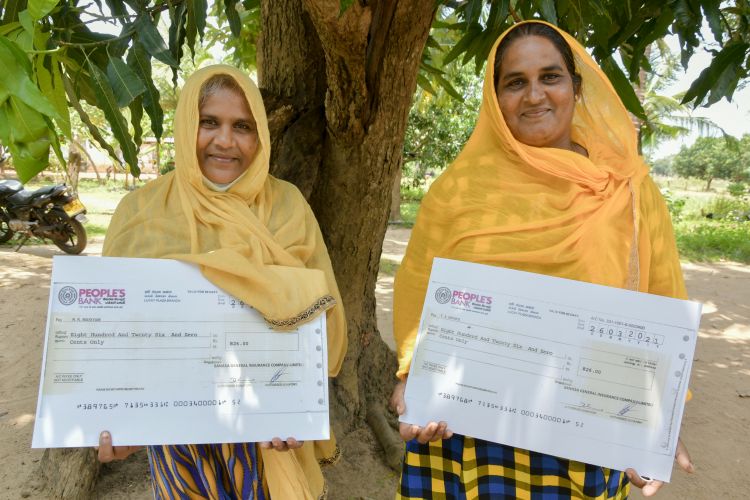OUTCOME STORY
Weather index
insurance for all
Natural disasters such as floods and droughts are not selective in who they target. However, it is the marginalized and vulnerable people who suffer the most when natural disasters decimate their livelihoods. These disasters are now occurring with increasing frequency, so IWMI has been working to make Weather Index Insurance (WII) broadly available among affected farmers in Sri Lanka to ensure they are properly compensated in the event of losses.
In theory, WII can increase the ability of vulnerable farmers to recover financially from climate shocks with the compensation they receive, enabling them to resume cultivation in the following season. Using mainly satellite images to help predict damage and assess losses, WII facilitates faster compensation payouts to farmers by avoiding time-consuming verification of the damage caused at field level. This can result in low transaction costs and allow WII to be more affordable for smallholder farmers. When bundled with agricultural inputs and crop/climate advisory services, such as weekly rainfall forecasts and advisory on crop management practices, WII can expand the potential reach of insurance coverage to remote areas previously considered uninsurable.
However, in practice, WII programs struggle to attract the people most in need of protection, particularly marginalized women and men. Reaching remote and diverse communities with technically complex index insurance products is an enormous challenge.
Social and cultural divisions, combined with illiteracy and the lack of information and awareness about WII and its benefits, mean that small and marginal farmers that need support the most are often the first to be left out of WII schemes. These challenges can be compounded if the resources and time required to explain the complicated technicalities of WII to farmers and assist them to meet the eligibility criteria are not available. If those who need WII the most are not enlisted, existing inequalities will be reinforced and opportunities to promote pro-poor and gender-sensitive development will be missed.
Bundling WII for greater reach
 There are other vulnerable and socially underprivileged groups in Sri Lanka that have not benefitted from WII. Traditional norms favor men’s privileges, resulting in additional constraints to women’s equitable access to land and capital. These challenges are in fact similar across much of the developing world.
There are other vulnerable and socially underprivileged groups in Sri Lanka that have not benefitted from WII. Traditional norms favor men’s privileges, resulting in additional constraints to women’s equitable access to land and capital. These challenges are in fact similar across much of the developing world.
Sri Lankan farmers emphasized that before adopting WII packages, they need to be able to assess the costs and benefits based on understanding how key elements of the product work. This highlights the importance of investing in awareness raising through a combination of print, verbal and visual tools that make complex products understandable to stakeholders with low levels of literacy.
IWMI researchers assessed the effectiveness of WII bundled with real-time climate and agronomic advisory services provided to farmers in Sri Lanka via mobile phones. The study concluded that partnering with local organizations can be a cost-effective way of gaining the social science skills and local networks needed to engage with target communities. Such partners can bring prior knowledge of community structures and political economies, and the requisite skill sets and trust of people to the process.
Developing a framework toward inclusion
In response to the need to address the challenges posed by complex social contexts to include the most vulnerable farmers, IWMI has developed a framework which provides a road map that allows different stakeholders involved in all stages of developing and implementing WII schemes to address issues of inclusion in a systematic way. This framework takes a process-oriented approach that ensures actions supporting inclusion and equity run through the entire process of WII design, implementation and post-implementation. It further recognizes that inclusion and equity considerations should dictate who is involved in WII design and implementation.
Deeper challenges that undermine adoption of the framework
IWMI held dialogues on actions to improve inclusion in WII with government representatives, insurers, practitioners, academics and civil society representatives mainly within the South Asia region. The dialogues and IWMI’s fieldwork highlighted that meaningful actions to enhance social inclusion will have to overcome several structural and system barriers.
Government policy and rules now need to be developed that can clarify the potential multiple policy objectives of WII and set standards (e.g., equity) to be met by future WII programs.
IWMI remains committed to moving this agenda forward and has closely collaborated with other CGIAR Research Centers. A community of CGIAR scientists will provide advice to the CGIAR Research Initiatives that have WII components. This will help ensure the initiatives address the nuances in WII that will set examples of how more inclusion of the particularly vulnerable can be created in these programs.
